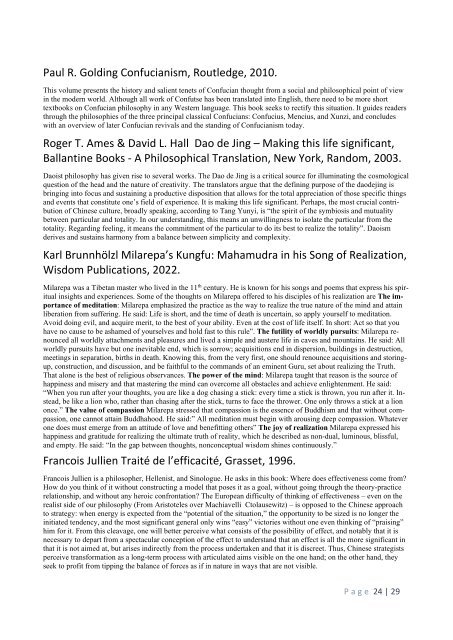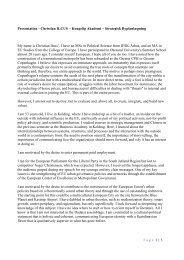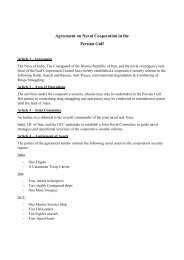china IR rev final sept 2023
This is the fourth and penultimate edition of my annotated bibliography on China international relations, art and Philosophy. from the books I distill policy relevant ideas for use and comsideration of policymakers after the ratification of the Cai, when the relatioship willl have to be managed
This is the fourth and penultimate edition of my annotated bibliography on China international relations, art and Philosophy. from the books I distill policy relevant ideas for use and comsideration of policymakers after the ratification of the Cai, when the relatioship willl have to be managed
Create successful ePaper yourself
Turn your PDF publications into a flip-book with our unique Google optimized e-Paper software.
Paul R. Golding Confucianism, Routledge, 2010.<br />
This volume presents the history and salient tenets of Confucian thought from a social and philosophical point of view<br />
in the modern world. Although all work of Confutse has been translated into English, there need to be more short<br />
textbooks on Confucian philosophy in any Western language. This book seeks to rectify this situation. It guides readers<br />
through the philosophies of the three principal classical Confucians: Confucius, Mencius, and Xunzi, and concludes<br />
with an overview of later Confucian <strong>rev</strong>ivals and the standing of Confucianism today.<br />
Roger T. Ames & David L. Hall Dao de Jing – Making this life significant,<br />
Ballantine Books - A Philosophical Translation, New York, Random, 2003.<br />
Daoist philosophy has given rise to several works. The Dao de Jing is a critical source for illuminating the cosmological<br />
question of the head and the nature of creativity. The translators argue that the defining purpose of the daodejing is<br />
bringing into focus and sustaining a productive disposition that allows for the total appreciation of those specific things<br />
and events that constitute one’s field of experience. It is making this life significant. Perhaps, the most crucial contribution<br />
of Chinese culture, broadly speaking, according to Tang Yunyi, is “the spirit of the symbiosis and mutuality<br />
between particular and totality. In our understanding, this means an unwillingness to isolate the particular from the<br />
totality. Regarding feeling, it means the commitment of the particular to do its best to realize the totality”. Daoism<br />
derives and sustains harmony from a balance between simplicity and complexity.<br />
Karl Brunnhölzl Milarepa’s Kungfu: Mahamudra in his Song of Realization,<br />
Wisdom Publications, 2022.<br />
Milarepa was a Tibetan master who lived in the 11 th century. He is known for his songs and poems that express his spiritual<br />
insights and experiences. Some of the thoughts on Milarepa offered to his disciples of his realization are The importance<br />
of meditation: Milarepa emphasized the practice as the way to realize the true nature of the mind and attain<br />
liberation from suffering. He said: Life is short, and the time of death is uncertain, so apply yourself to meditation.<br />
Avoid doing evil, and acquire merit, to the best of your ability. Even at the cost of life itself. In short: Act so that you<br />
have no cause to be ashamed of yourselves and hold fast to this rule”. The futility of worldly pursuits: Milarepa renounced<br />
all worldly attachments and pleasures and lived a simple and austere life in caves and mountains. He said: All<br />
worldly pursuits have but one inevitable end, which is sorrow; acquisitions end in dispersion, buildings in destruction,<br />
meetings in separation, births in death. Knowing this, from the very first, one should renounce acquisitions and storingup,<br />
construction, and discussion, and be faithful to the commands of an eminent Guru, set about realizing the Truth.<br />
That alone is the best of religious observances. The power of the mind: Milarepa taught that reason is the source of<br />
happiness and misery and that mastering the mind can overcome all obstacles and achieve enlightenment. He said:<br />
“When you run after your thoughts, you are like a dog chasing a stick: every time a stick is thrown, you run after it. Instead,<br />
be like a lion who, rather than chasing after the stick, turns to face the thrower. One only throws a stick at a lion<br />
once.” The value of compassion Milarepa stressed that compassion is the essence of Buddhism and that without compassion,<br />
one cannot attain Buddhahood. He said:” All meditation must begin with arousing deep compassion. Whatever<br />
one does must emerge from an attitude of love and benefitting others” The joy of realization Milarepa expressed his<br />
happiness and gratitude for realizing the ultimate truth of reality, which he described as non-dual, luminous, blissful,<br />
and empty. He said: “In the gap between thoughts, nonconceptual wisdom shines continuously.”<br />
Francois Jullien Traité de l’efficacité, Grasset, 1996.<br />
Francois Jullien is a philosopher, Hellenist, and Sinologue. He asks in this book: Where does effectiveness come from?<br />
How do you think of it without constructing a model that poses it as a goal, without going through the theory-practice<br />
relationship, and without any heroic confrontation? The European difficulty of thinking of effectiveness – even on the<br />
realist side of our philosophy (From Aristoteles over Machiavelli Ctolausewitz) – is opposed to the Chinese approach<br />
to strategy: when energy is expected from the “potential of the situation,” the opportunity to be sized is no longer the<br />
initiated tendency, and the most significant general only wins “easy” victories without one even thinking of “praising”<br />
him for it. From this cleavage, one will better perceive what consists of the possibility of effect, and notably that it is<br />
necessary to depart from a spectacular conception of the effect to understand that an effect is all the more significant in<br />
that it is not aimed at, but arises indirectly from the process undertaken and that it is discreet. Thus, Chinese strategists<br />
perceive transformation as a long-term process with articulated aims visible on the one hand; on the other hand, they<br />
seek to profit from tipping the balance of forces as if in nature in ways that are not visible.<br />
Page 24 | 29








